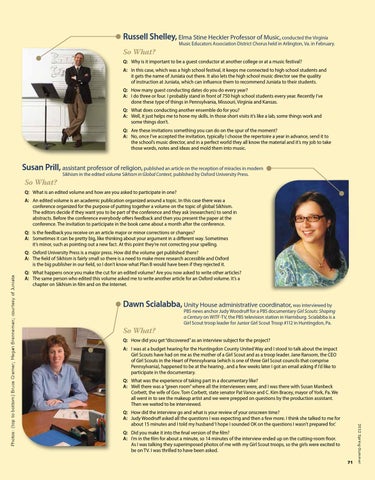Russell Shelley, Elma Stine Heckler Professor of Music, conducted the Virginia
So What?
Music Educators Association District Chorus held in Arlington, Va. in February.
Q: Why is it important to be a guest conductor at another college or at a music festival? A: In this case, which was a high school festival, it keeps me connected to high school students and it gets the name of Juniata out there. It also lets the high school music director see the quality of instruction at Juniata, which can influence them to recommend Juniata to their students. Q: How many guest conducting dates do you do every year? A: I do three or four. I probably stand in front of 750 high school students every year. Recently I’ve done these type of things in Pennsylvania, Missouri, Virginia and Kansas. Q: What does conducting another ensemble do for you? A: Well, it just helps me to hone my skills. In those short visits it’s like a lab, some things work and some things don’t. Q: Are these invitations something you can do on the spur of the moment? A: No, once I’ve accepted the invitation, typically I choose the repertoire a year in advance, send it to the school’s music director, and in a perfect world they all know the material and it’s my job to take those words, notes and ideas and mold them into music.
Susan Prill, assistant professor of religion, published an article on the reception of miracles in modern
So What?
Sikhism in the edited volume Sikhism in Global Context, published by Oxford University Press.
Q: What is an edited volume and how are you asked to participate in one? A: An edited volume is an academic publication organized around a topic. In this case there was a conference organized for the purpose of putting together a volume on the topic of global Sikhism. The editors decide if they want you to be part of the conference and they ask (researchers) to send in abstracts. Before the conference everybody offers feedback and then you present the paper at the conference. The invitation to participate in the book came about a month after the conference. Q: Is the feedback you receive on an article major or minor corrections or changes? A: Sometimes it can be pretty big, like thinking about your argument in a different way. Sometimes it’s minor, such as pointing out a new fact. At this point they’re not correcting your spelling.
Q: What happens once you make the cut for an edited volume? Are you now asked to write other articles? A: The same person who edited this volume asked me to write another article for an Oxford volume. It’s a chapter on Sikhism in film and on the Internet.
Dawn Scialabba, Unity House administrative coordinator, was interviewed by
So What?
PBS news anchor Judy Woodruff for a PBS documentary Girl Scouts: Shaping a Century on WITF-TV, the PBS television station in Harrisburg. Scialabba is a Girl Scout troop leader for Junior Girl Scout Troop #112 in Huntingdon, Pa.
Q: How did you get “discovered” as an interview subject for the project? A: I was at a budget hearing for the Huntingdon County United Way and I stood to talk about the impact Girl Scouts have had on me as the mother of a Girl Scout and as a troop leader. Jane Ransom, the CEO of Girl Scouts in the Heart of Pennsylvania (which is one of three Girl Scout councils that comprise Pennsylvania), happened to be at the hearing , and a few weeks later I got an email asking if I’d like to participate in the documentary. Q: What was the experience of taking part in a documentary like? A: Well there was a “green room” where all the interviewees were, and I was there with Susan Manbeck Corbett, the wife of Gov. Tom Corbett, state senator Pat Vance and C. Kim Bracey, mayor of York, Pa. We all went in to see the makeup artist and we were prepped on questions by the production assistant. Then we waited to be interviewed. Q: How did the interview go and what is your review of your onscreen time? A: Judy Woodruff asked all the questions I was expecting and then a few more. I think she talked to me for about 15 minutes and I told my husband ‘I hope I sounded OK on the questions I wasn’t prepared for.’ Q: Did you make it into the final version of the film? A: I’m in the film for about a minute, so 14 minutes of the interview ended up on the cutting-room floor. As I was talking they superimposed photos of me with my Girl Scout troops, so the girls were excited to be on TV. I was thrilled to have been asked. 71
2012 Spring-Summer
Photos: (top to bottom) Bruce Cramer; Megan Brenneman; courtesy of Juniata
Q: Oxford University Press is a major press. How did the volume get published there? A: The field of Sikhism is fairly small so there is a need to make more research accessible and Oxford is the big publisher in our field, so I don’t know what Plan B would have been if they rejected it.
